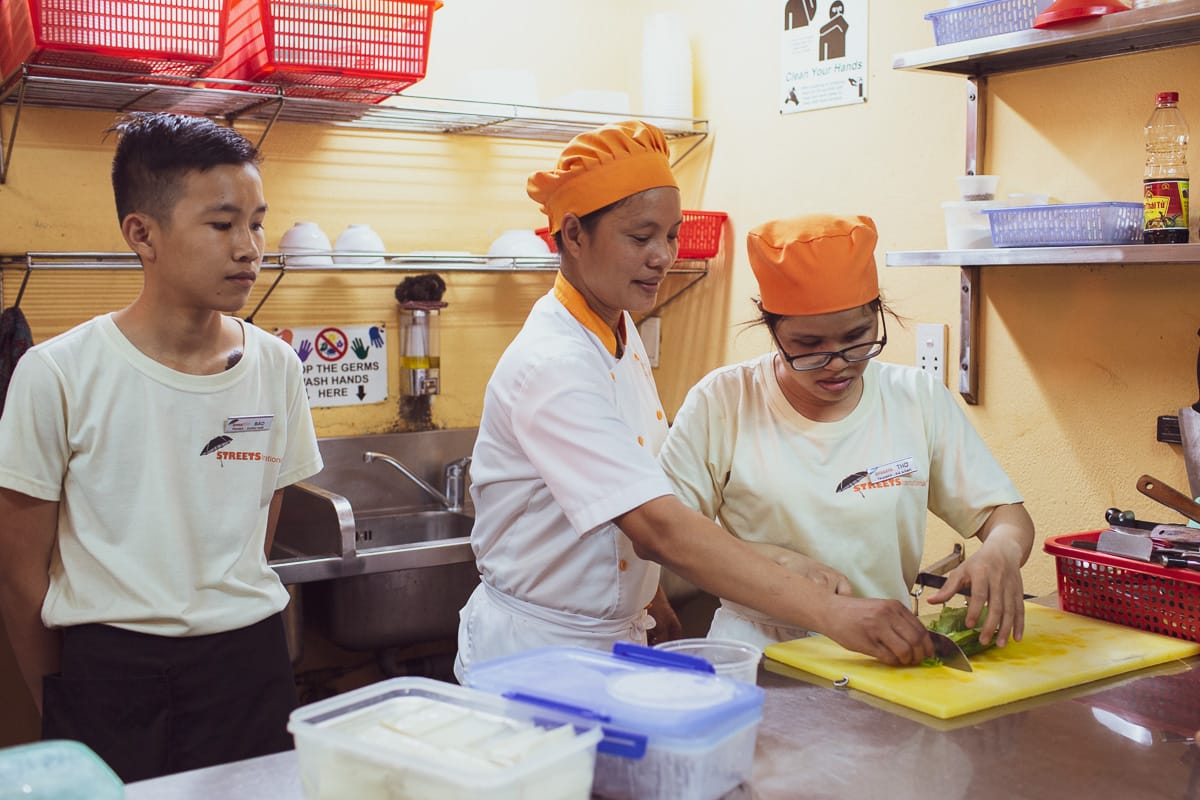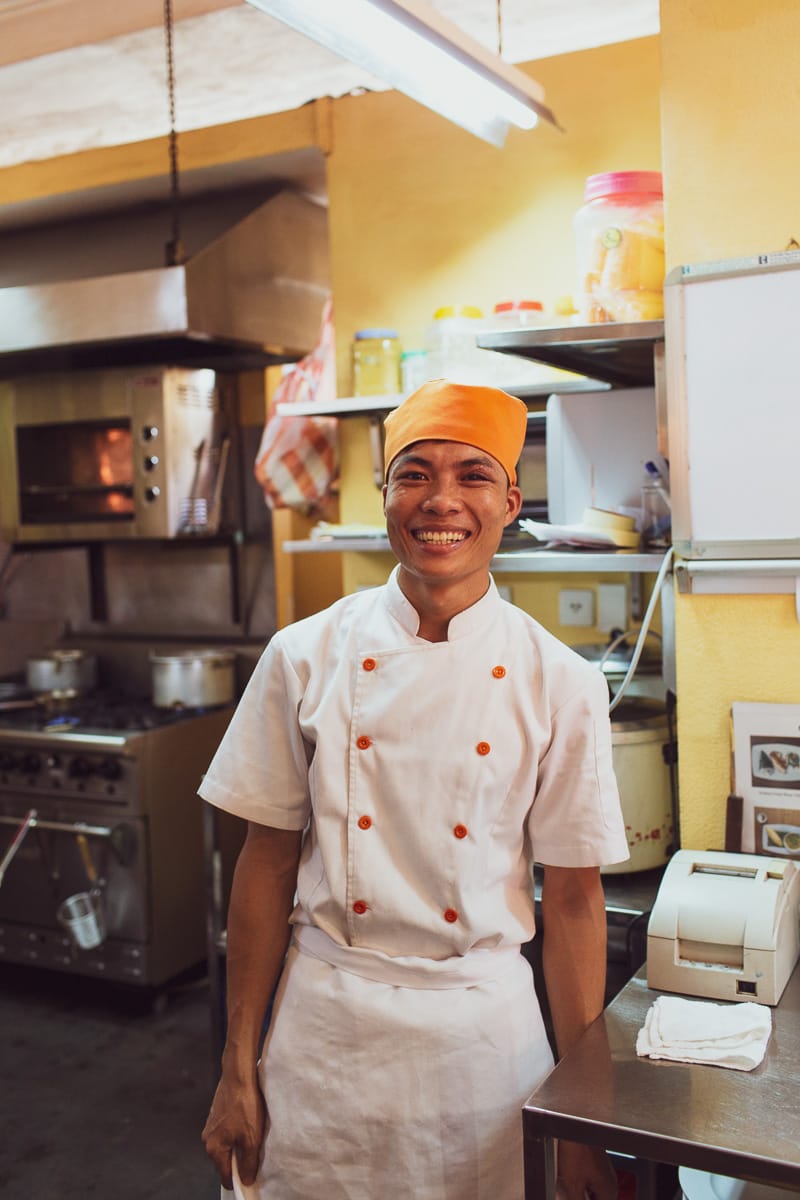With nine years of experience providing hospitality, culinary, and language training to disadvantaged youth, STREETS International is one of the most established social enterprises in central Vietnam. With a curriculum endorsed by The Institute of Culinary Excellence in New York, STREETS International graduates have gone on to work for some of the largest hospitality brands in Vietnam and abroad. Their supporters include chef Peter Cuong Franklin from Anan Saigon and Chicago-based chef Thai Dang from HaiSous Restaurant.
We met with STREETS International founder Neal Bermas to hear how the successful project began and to pick his brain about plans for the future.
Neal Bermas first visited Vietnam 19 years ago, just as the country opened its borders, and recalls being overwhelmed by what he saw. During his travels around Southeast Asia, Neal came across a number of restaurants working to improve the lives of street kids.
“Like any good, ethical traveler I visited and supported them. Unfortunately, I always came away underwhelmed. There was a common theme of projects run by well-meaning individuals who had little to no experience in business, hospitality, or education,” Neal explains.
Those experiences inspired Neal to start a similar project in Hoi An using his background in business, hospitality, and training to raise the standards used to measure success. “My overall philosophy for myself and others is that if you demand a lot, you get a lot back,” Neal shrugs.

Why did you choose to set up your project in Vietnam?
My father always asked me this question. It’s not that there isn’t poverty in the States. I simply felt that I could make more of a difference here. In the States, a project like this would be much more difficult to manage. We house, feed, and supervise 60 students—I can’t imagine the economics of doing that in New York.
Who applies to STREETS International? With limited space, is selecting the students a difficult process? How do you decide who will become a participant?
Our students are 17 to 22 years old and come from all over the country. What links them together are their experiences with poverty. They rarely have a safe place to sleep and having three meals a day is rare. We prioritize applicants based on a few criteria. Firstly, we make sure there is clear gender equality. We also prioritize ethnic minority communities who are at a higher risk of human trafficking.

We have great a network that regularly makes referrals and that helps students with the application process. For a class of 25 students, we will get 125 applicants. This process is always difficult and time-consuming but it’s important. We’ve been lucky enough to enjoy a success rate that is pushing 100%. This provides us with the data we need to help select students that will mesh well with STREETS International Hoi An.
Are there any trainees with particularly interesting stories that you’d like to share with our readers?
One of our current trainees, Dai, comes from Hanoi. His father died when he was very young and soon after that his mother drowned. When he was seven, Dai went to the SOS Village where he lived until he graduated high school. He worked at a local beer shop until SOS introduced him to STREETS International, and supported his application for the training program.
Since coming to STREETS International he has not only learned English. He’s being taught how to be a hospitality professional. “I learned how to behave well with others and be part of the team,” Dai recently told me. “Living together with the others boys in the supervised STREETS Boys’ House was a helpful experience.”
Your program provides more than culinary and hospitality training for the students. Are there any other benefits to your program?
One of the most important things that we offer is English language training. Throughout the 18-month program, students will acquire a very high level of English. We also offer comprehensive life skills education like CPR and budgeting. These classes cover topics that many of our students would never have even thought about. Think of it as a holistic approach. Graduates come away with a well-rounded skill set that will benefit their professional and personal lives.

Tell us about the teachers. What kinds of backgrounds are they coming from?
All our teaching staff are Vietnamese. Not only are they great teachers, but they are also role models. Many of the trainers are part-time as they also have jobs in the hospitality industry. Our teachers bring practical life experiences and combine it with our carefully developed syllabus. This helps students learn skills that are relevant both in the class and in life.
We love to hear about these success stories. Would you mind sharing more?
Phuong was one of our first graduates. Recently she returned to STREETS International as a restaurant manager and in-service trainer. Phuong grew up off the coast of Hoi An on the Cham Islands with no running water, healthcare, or high school.
Before returning to work for us, Phuong worked as a server and moved up the chain to become supervisor at the renowned Four Seasons “The Nam Hai” in Danang. She continued her career in the high-end luxury market at the Park Hyatt Saigon where she rose through the ranks until she became the assistant food and beverage outlet manager.
My dream is to hand STREETS International over to a team of graduates one day. I can’t wait to see who ends up managing the place and continuing the good work.

How do you successfully weave your motivation to “do good” into a social enterprise?
I feel that the best social enterprises are run by people with business backgrounds rather than those that have only worked with charities. Social enterprise platforms are very interesting but more often than not, they are not managed well. For example, a coffee shop giving 10% of its profit to charity is not a social enterprise, it’s marketing!
The key is to understand business and not find the concept distasteful. Profit is not an evil thing. For us, it’s about combining heart and head, implementing the process of doing good into the core of our business model.
A number of prominent chefs have supported your work. Do they play a larger role in STREETS International?
We receive a lot of help from the restaurant industry and from well-known chefs. Our annual dinners are held in New York and Saigon. Without the helping hands from the food and beverage industry, these events would be hard to pull off. These fundraisers have actually helped us build long-term support…and some true friends.
Celebrity chefs like Aaron Bludorn from Michelin-starred restaurant Cafe Boulud gave up his time to cook and interact with our guests. It’s no small sacrifice for a New York chef to be away from their restaurant on a busy night. Our Saigon dinner is also gaining traction. Chef Peter Cuong Franklin from Anan Saigon took care of the food at the latest event, and he is also part of our chef advisory board.
Chef’s Robert Danhi and Thai Dang also took part in one of our Saigon dinners. They came all the way from the USA just to be a part of our event—they even paid out-of-pocket and purchased their own plane tickets.
You have already expanded from Hoi An to Saigon, are there plans for other locations?
We had a one-class trial run in Saigon. We quickly realized that focusing on bringing more students to Hoi An was better than building new operations elsewhere. The economics of housing students, hiring teachers, and running a restaurant just didn’t make sense in Saigon. One practical example is transportation in the a city. Each student is given a bicycle to get around Hoi An, but that wouldn’t work in Saigon. Following the trial there, we set the objective that at least one-third of our trainees come from Saigon. This seemed like a more effiecent and fair solution.
We teach kids from all over the country and offer three concurrent classes rather than two. This allows us to support more children each year. Expanding to other countries is still a possibility but finding a place that has all the elements we found here in Hoi An will be no easy task.
Related Content:
[Article] Startups In Vietnam: Danang’s Innovation Hub By The Sea
[Article] Mui Ne Anantara Resort GM Talks Tourism Potential
